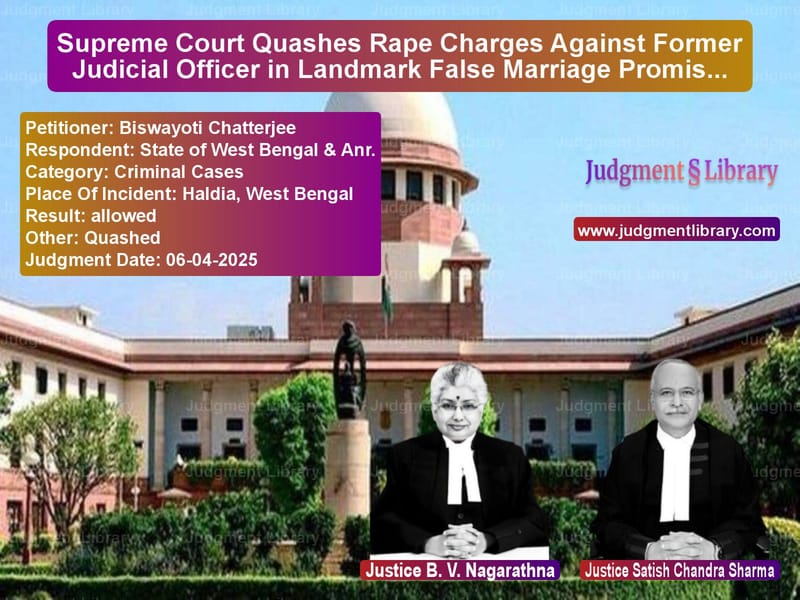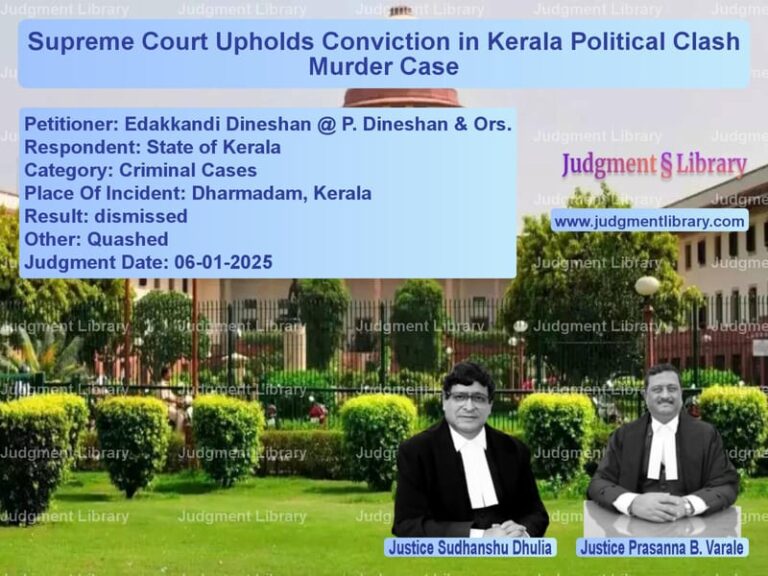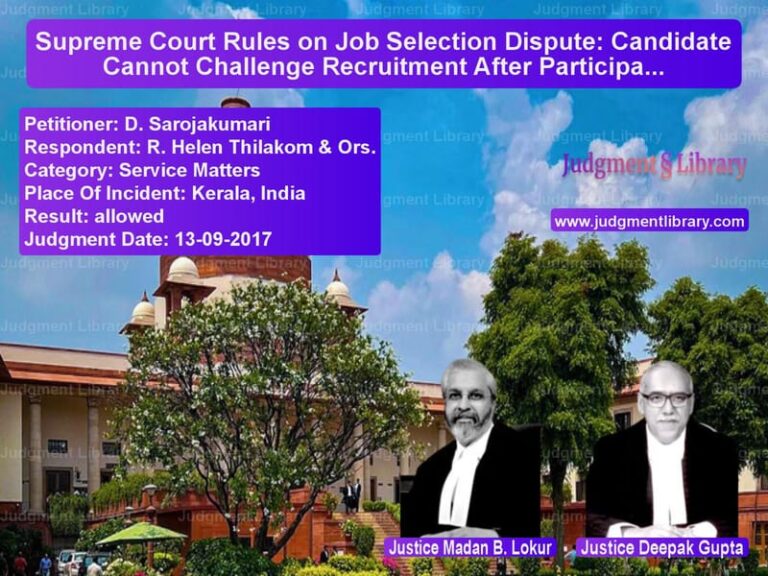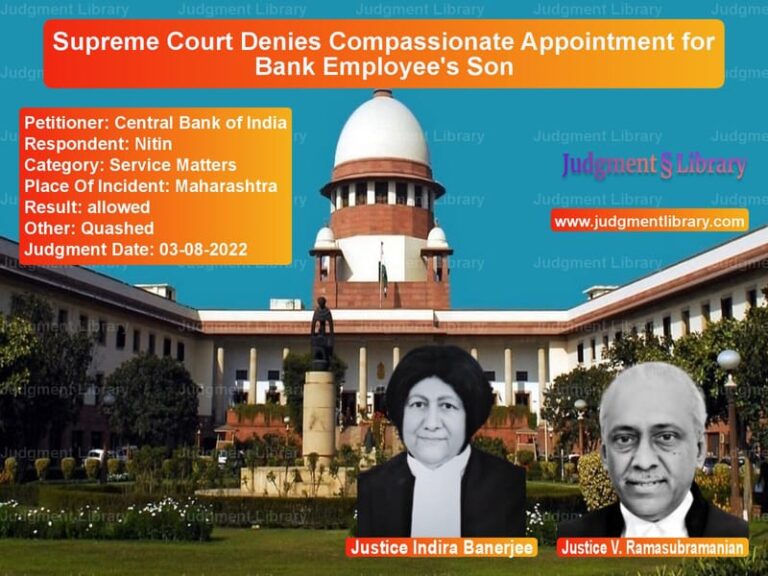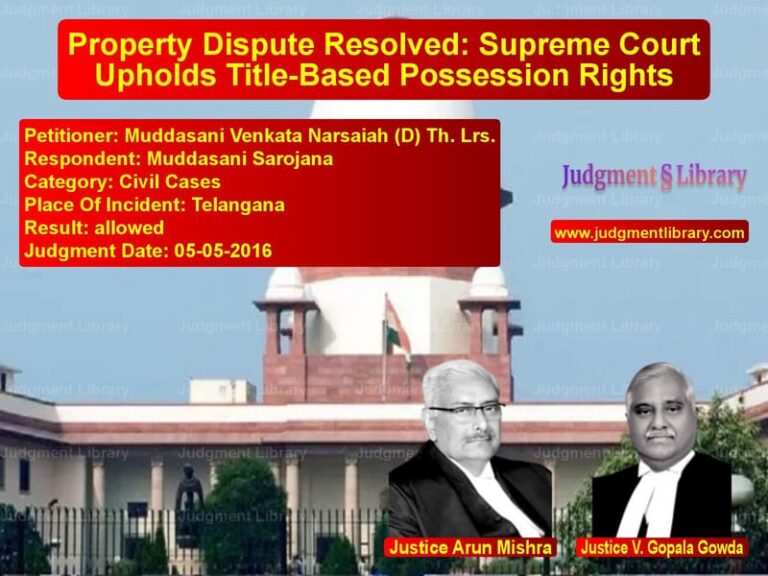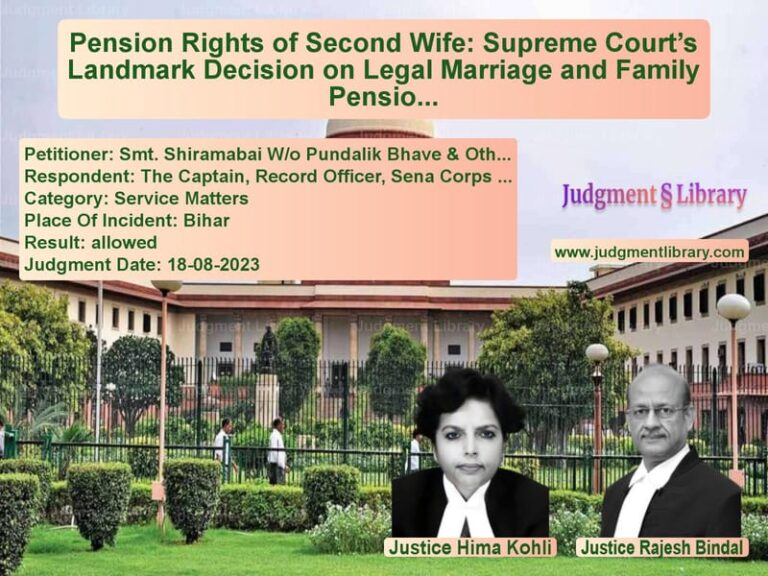Supreme Court Quashes Rape Charges Against Former Judicial Officer in Landmark False Marriage Promise Case
In a landmark judgment that clarifies the legal boundaries between consensual relationships and sexual offenses under false pretenses, the Supreme Court of India recently delivered a comprehensive verdict in Criminal Appeal No. ______ of 2025 (Arising out of SLP (Crl.) No. 4261 of 2024) between Biswayoti Chatterjee (Appellant) versus State of West Bengal & Anr. (Respondents). The 3,200-word judgment, authored by Justices B.V. Nagarathna and Satish Chandra Sharma, provides detailed analysis of the legal principles governing cases involving allegations of rape based on false promises of marriage.
Detailed Case Background and Proceedings
The case originated from FIR No. 13/2015 registered on 14.12.2015 with Mahila Police Station, Haldia, District Purba Medinipur, West Bengal under Sections 376 (rape), 417 (cheating) and 506 (criminal intimidation) of the Indian Penal Code. The complainant, a 36-year-old woman undergoing divorce proceedings from her first husband, alleged that she came in contact with the appellant in 2014 when he was serving as Additional Chief Judicial Magistrate (ACJM) in Haldia.
The prosecution’s case, as detailed in the FIR and subsequent charge-sheet, contained several specific allegations:
- The appellant, while holding judicial office, allegedly promised marriage to the complainant
- He arranged for her accommodation in a rented house at Tamluk
- Got her son admitted to Tamralipta Public School at his expense
- Regularly transferred money to her bank account for maintenance
- Established physical relations on multiple occasions between 2014-2015
- Allegedly threatened her son when she demanded fulfillment of marriage promise
The legal journey of the case saw several significant developments:
- 13.01.2016: The appellant was granted anticipatory bail by Calcutta High Court in CRM No. 11930/2015
- 30.04.2020: CID West Bengal filed charge-sheet against appellant and co-accused Advocate Gopal Chandra Dass
- 21.11.2022: Calcutta High Court dismissed CRR No. 1550/2020, observing prima facie material exists
- 04.01.2024: Sessions Court dismissed discharge application under Section 227 CrPC
- 23.02.2024: Calcutta High Court dismissed revision petition (CRR No. 639/2024)
Detailed Submissions by Parties
Appellant’s Arguments (Verbatim from Court Records)
The appellant’s counsel made several crucial submissions challenging the criminal proceedings:
“The Impugned Order dated 23.02.2024 passed by the High Court is a non-speaking Order which fails to consider that the relationship was ‘consensual’ in nature and lasted for over a year. Both parties were mature adults – the Appellant was 56 years old while the Complainant was 36 years old with an 11-year-old child.”
The appellant’s legal team emphasized:
- The essential ingredient for offence under Section 376(2)(f) IPC (false promise to marry) was absent
- The promise was unenforceable as appellant was still married during the relationship
- No evidence of dishonest inducement under Section 417 IPC
- Complainant was fully aware of appellant’s marital and professional status
- Cited precedent: Dr. Dhruvaram Muralidha Sonar vs State of Maharashtra (2019)
State’s Counter-Arguments (Verbatim from Court Records)
Inspector Gautam Saha, representing CID West Bengal, filed a detailed affidavit dated 21.09.2024 arguing:
“The Appellant, while holding the post of ACJM, Haldia had used his post to obtain trust of the victim and promised to marry her. He took undue advantage of his position and the vulnerability of the Complainant and sexually exploited her under false pretext of marriage.”
The prosecution highlighted several pieces of evidence:
- Statements of security guard Anup Kumar Malik and driver Pranab Midda about appellant’s conduct
- CFSL report analyzing mobile numbers allegedly used by appellant
- Consistency between complainant’s narration and witness testimonies
- Cited precedent: Central Bureau of Investigation vs Aryan Singh (2023) regarding limited scope at discharge stage
Court’s Detailed Analysis and Reasoning
The Supreme Court’s 1,500-word analysis portion provides comprehensive legal reasoning:
1. On Consent and Misconception of Fact
The bench extensively discussed the legal concept of consent in sexual relationships, citing multiple precedents:
“In Pramod Suryabhan Pawar vs State of Maharashtra (2019), this Court summarized that ‘consent’ under Section 375 requires active and reasoned deliberation. To vitiate consent based on promise to marry, two elements must be shown: (1) the promise was false when made, given in bad faith with no intention to fulfill; (2) the promise directly induced the sexual act.”
The Court noted that the complainant was aware throughout that the appellant was a married (though separated) man, which undermined the claim of misconception.
2. Prolonged Nature of Relationship
Referring to Prashant Bharti vs State of NCT of Delhi (2024), the judgment states:
“The relationship continued for over a year with financial support, school admission arrangements, and multiple physical encounters. This prolonged association suggests voluntary participation rather than induced consent.”
3. Position of Authority Consideration
While acknowledging the appellant’s judicial position, the Court observed:
“Though the Appellant was in a position of power as a judicial officer, there is no evidence of actual inducement or enticement. The Complainant, an educated woman involved in litigation, was capable of understanding the implications of the relationship.”
4. Inconsistencies in Prosecution Case
The judgment highlights several contradictions:
- Complainant’s statement about being introduced to co-accused Advocate Dass
- Timeline discrepancies regarding when threats allegedly began
- Lack of immediate complaint after alleged refusal to marry
5. Abuse of Process Observation
The Court made significant remarks about misuse of legal provisions:
“We find a growing tendency to initiate criminal proceedings when relationships turn sour. Not every broken promise of marriage, especially between consenting adults aware of circumstances, can be labeled as rape. Such misuse amounts to abuse of process.”
Final Ruling and Directions
After this exhaustive analysis, the Supreme Court concluded:
“In our considered view, the physical relationship was consensual and cannot be said to be without consent or against will. The ingredients of Sections 376, 417 and 506 IPC are not made out. Continuing proceedings would be travesty of justice.”
The Court issued specific directions:
- Impugned High Court order dated 23.02.2024 set aside
- Sessions Court discharge order dated 04.01.2024 restored
- All criminal proceedings in FIR No. 13/2015 quashed
- No order as to costs
Legal Significance and Precedential Value
This judgment contributes significantly to Indian criminal jurisprudence by:
- Clarifying distinction between breach of promise and false promise in rape cases
- Establishing parameters for evaluating consent in prolonged relationships
- Setting boundaries against misuse of sexual assault provisions
- Providing safeguards for consensual relationships between adults
The detailed analysis of evidentiary standards and interpretation of consent provisions makes this a landmark ruling likely to be cited in similar cases.
Petitioner Name: Biswayoti Chatterjee.Respondent Name: State of West Bengal & Anr..Judgment By: Justice B. V. Nagarathna, Justice Satish Chandra Sharma.Place Of Incident: Haldia, West Bengal.Judgment Date: 06-04-2025.Result: allowed.
Don’t miss out on the full details! Download the complete judgment in PDF format below and gain valuable insights instantly!
Download Judgment: biswayoti-chatterjee-vs-state-of-west-bengal-supreme-court-of-india-judgment-dated-06-04-2025.pdf
Directly Download Judgment: Directly download this Judgment
See all petitions in Rape Cases
See all petitions in Bail and Anticipatory Bail
See all petitions in Fraud and Forgery
See all petitions in Extortion and Blackmail
See all petitions in Attempt to Murder Cases
See all petitions in Judgment by B.V. Nagarathna
See all petitions in Judgment by Satish Chandra Sharma
See all petitions in allowed
See all petitions in Quashed
See all petitions in supreme court of India judgments April 2025
See all petitions in 2025 judgments
See all posts in Criminal Cases Category
See all allowed petitions in Criminal Cases Category
See all Dismissed petitions in Criminal Cases Category
See all partially allowed petitions in Criminal Cases Category

